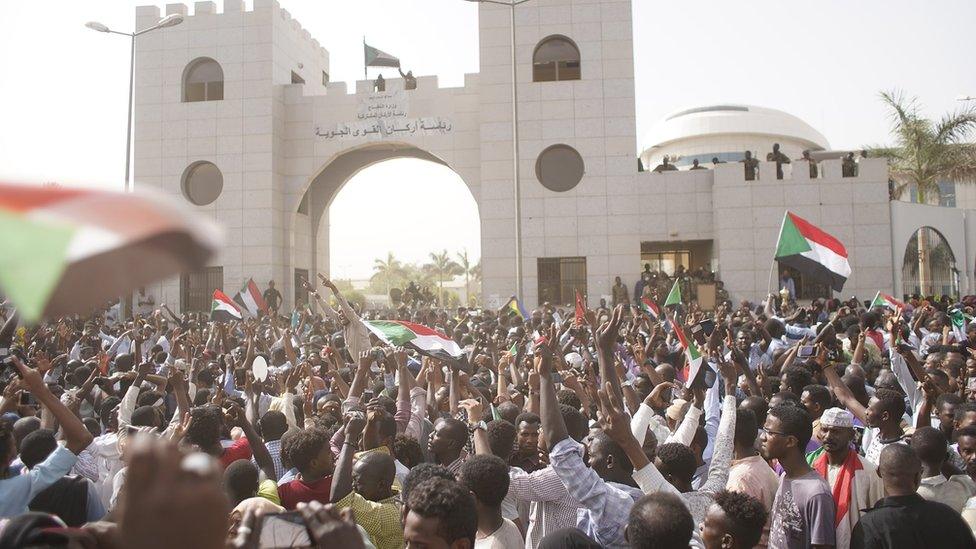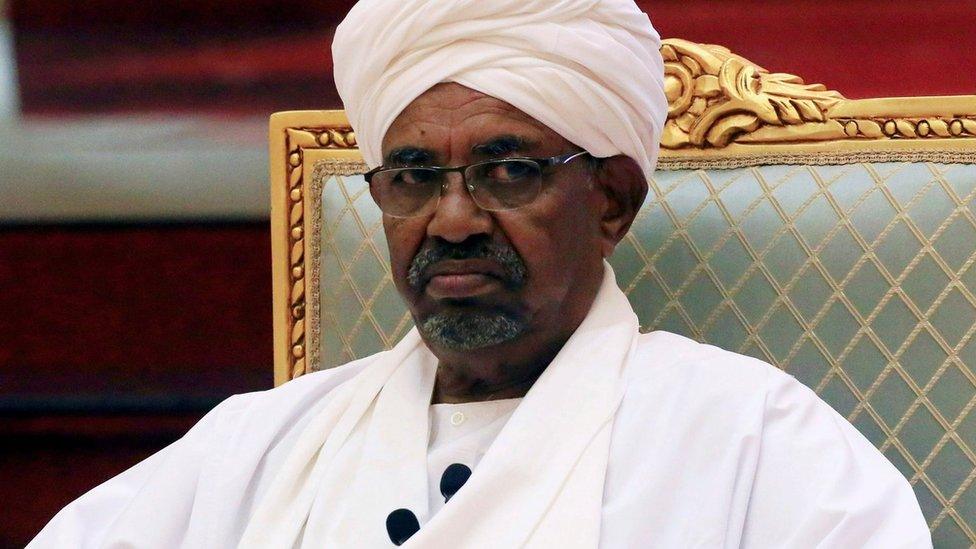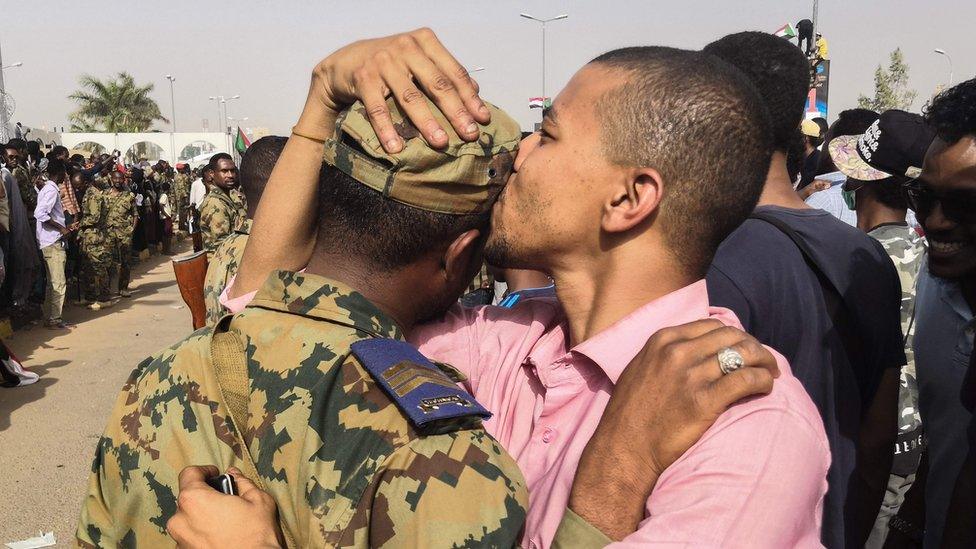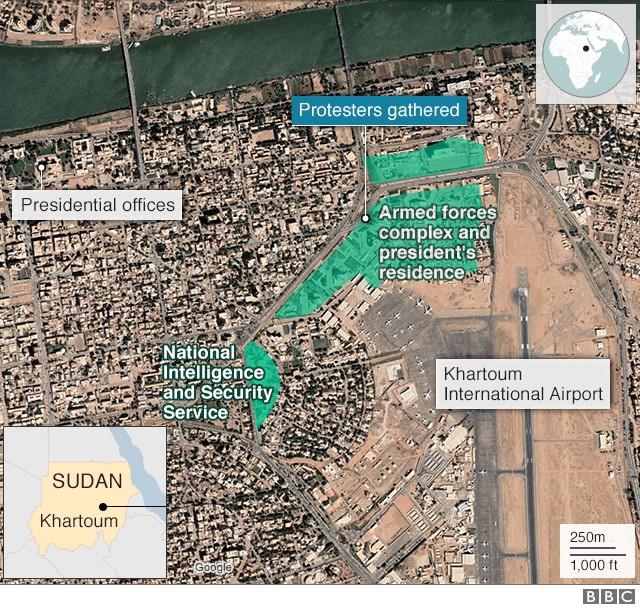Sudan protests: Demonstrators wait for army statement
- Published

Protesters remain outside the army headquarters
Sudan's army has told the nation to expect an announcement following growing protests calling for President Omar al-Bashir to step down.
The army's message sparked jubilant scenes among Sudanese convinced that a coup was under way, but it remained unclear what was happening.
Thousands marched through Khartoum, some chanting: "It has fallen, we won."
Protests against Mr Bashir, who has governed Sudan since 1989, have been under way for several months.
They were originally sparked by a rise in the cost of living, but grew into a broader anti-government movement.
What is the latest?
In the early hours of Thursday, several military vehicles were seen entering the large compound in Khartoum that houses the Ministry of Defence, the army headquarters and Mr Bashir's personal residence, AFP reported.
The compound has been the focus of a sit-in by tens of thousands of protesters who have been urging the military to oust Mr Bashir.
Troops have also raided Mr Bashir's Islamic movement, linked to the ruling party, and deployed at key locations in the capital.
Meanwhile, Sudan's state news agency reported that all the political prisoners in the country were being released.

Mr Bashir has been in power since 1989
State TV and radio interrupted their programming, with TV broadcasting a message that the army would be making a statement.
The leading protest group, the Association of Sudanese Professionals, said power had to be handed over to a civilian transitional government made up of people who had no links to the "tyrannical regime".
It urged demonstrators to remain at the sit-in to ensure there was no "partial or false solution".
A woman dubbed "Kandaka", which means Nubian queen, has become a symbol for protesters
Protester Hiba Ali told the BBC that "the suspense is killing" as she and others waited for the military to tell them what was happening.
"It's not just Bashir stepping down. It's also about the whole regime going down and everything that came with it and 30 years of oppression," she said
"So what we want is a transition to a democracy. We want a civilian government and hand over of the authority and power to the people."
Footage posted on social media showed an exchange of gunfire outside the army headquarters.
Allow X content?
This article contains content provided by X. We ask for your permission before anything is loaded, as they may be using cookies and other technologies. You may want to read X’s cookie policy, external and privacy policy, external before accepting. To view this content choose ‘accept and continue’.
Other footage appeared to show people taking down posters of Mr Bashir and protesters entering an intelligence service building in the eastern city of Port Sudan.
How has the government responded?
Attempts by the authorities to quell the protests, which include security forces loyal to Mr Bashir opening fire on protesters, have been unsuccessful.
Earlier this week, the sit-in protesters were attacked on two consecutive nights, but on both occasions the army reportedly stepped in to protect them.
Police have ordered officers not to intervene against the protests. On Tuesday, a police spokesman called for "an agreement which would support the peaceful transition of power".
Sudan protests: So what's going on?
The government has been criticised by rights groups for a heavy-handed response to the unrest.
Government officials admit 38 people have died since the unrest began in December, but the rights group Human Rights Watch says the number is higher.
In February, it looked as though the president might step down, but instead Mr Bashir declared a state of national emergency.
Who is Omar al-Bashir?
Formerly an army officer, he seized power in a military coup in 1989.
His rule has been marked by civil war. The civil conflict with the south of the country ended in 2005 and South Sudan became independent in 2011.

Protesters have been appealing the army to remove Mr Bashir
Another civil conflict has been taking place in the western region of Darfur. Mr Bashir is accused of organising war crimes and crimes against humanity there by the International Criminal Court (ICC).
Despite an international arrest warrant issued by the ICC, he won consecutive elections in 2010 and 2015. However, his last victory was marred by a boycott from the main opposition parties.
The arrest warrant has led to an international travel ban. However, Mr Bashir has made diplomatic visits to Egypt, Saudi Arabia and South Africa. He was forced into a hasty departure from South Africa in June 2015 after a court considered whether to enforce the arrest warrant.

